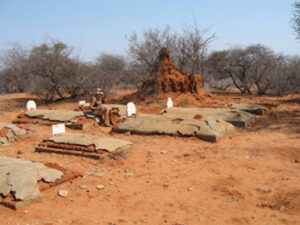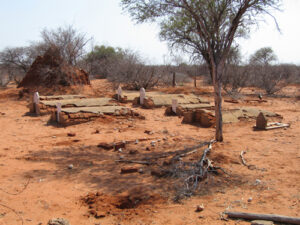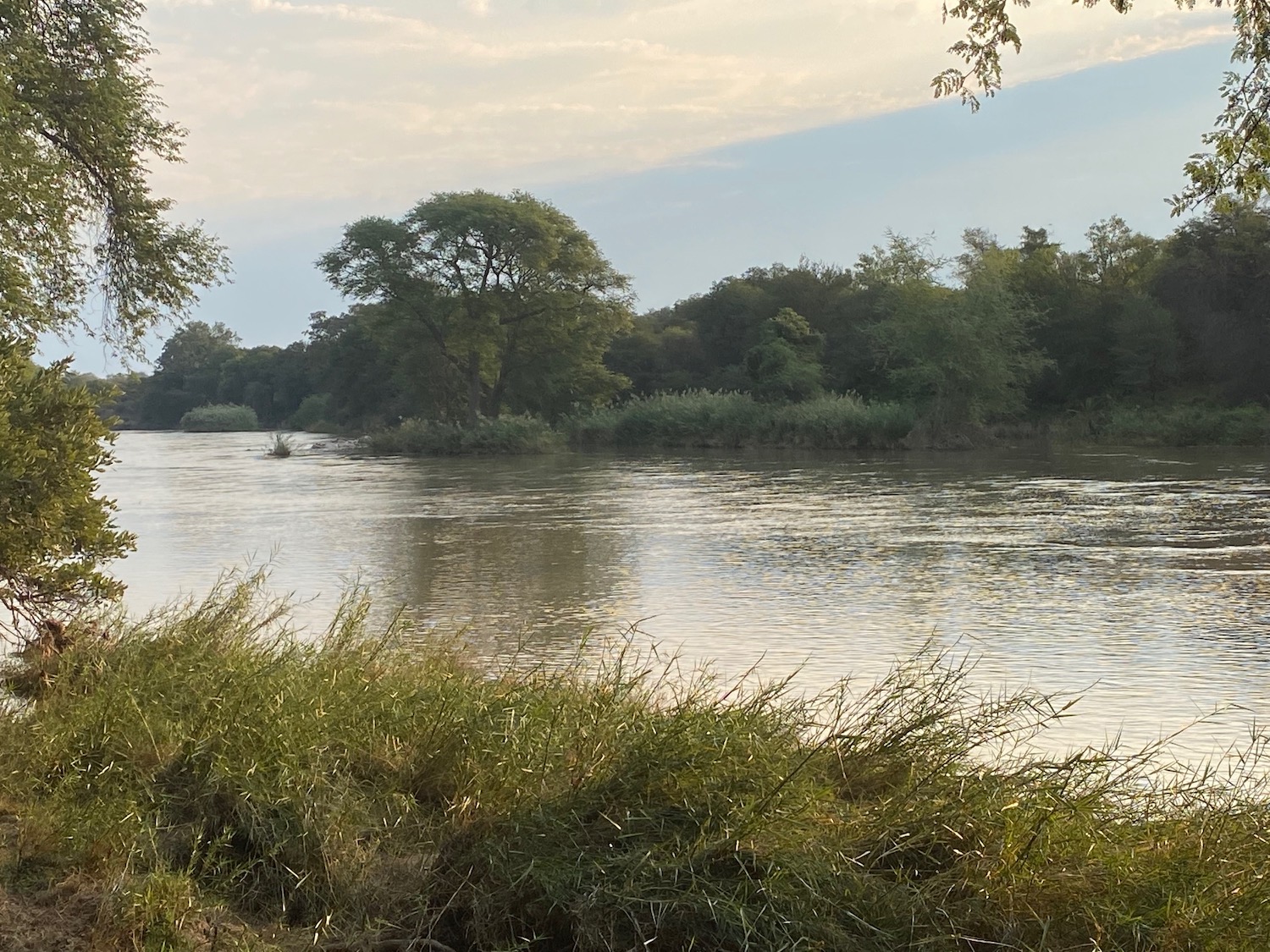Angie’s love of the African bush takes her back to the South African farm on the Limpopo river where she spent much of her childhood. Hauntingly beautiful, isolated and arid, little has changed. The “vermin” have gone but the invocation remains the same – for rain.
There is a farm on the Limpopo river, just west of Alldays which suffocates beneath a scorching sky. The dry weeks have turned to dry months and soon if the rains do not come we will talk about the driest time in ‘living memory’. But living memory is short.
This land has never been anything other than what it is. Ball breaking tough. It has never beckoned the faint hearted. Not once in its history and the farm is steeped in history. It has been captured in paintings by Thomas Baines, fired up the imagination of our greatest writers and poets, Louis Leipoldt and Eugène Marais and it claims to have entertained visitors such as Kipling, Rhodes and Jameson. Yet, it is a group of graves which lie beyond the bone dry ‘ sluit’ a few hundred metres from the old homestead which tell the greatest tale of all.

Surrounded by the ubiquitous jacaranda trees and corrugated iron water tank, stands the old homestead with its tin roof, fly screened doors and cracked concrete floors. A breezy rambling stoep surrounds three sides of the house and it is here we sit and gaze at the red sand that has turned to powdered ochre. The acacias stripped of foliage stand tortured against the cloudless sky. The windmills clank and turn and pump and even they sound exhausted. The buck which have survived so far, nibble nervously on dried seed pods and bitter tree bark. Warthogs dart here and there, more indignant about their lot than ever, while vultures circle effortlessly in the thermals above, they have never had it so good.
The graves are easy to miss although they rise from the ground like sarcophagi constructed from hand made red bricks, encased in concrete. Today, the bricks are scattered, the concrete shattered by heat and rain, as if they might be reclaimed by the earth at any time. They lie in straight lines, pages of a history book telling a story of unimaginable plight and hardship of one family, the Verviers. The family were ‘pondt’ farmers, descendants of settlers who had trekked from the Cape colony and lived off land sold to them in the late 1800’s for a Pound. These farmers fought a battle with heat, isolation, malnutrition, malaria and bilharzia, but the greatest battle raged with marauding lion and leopard, “vermin” which killed their cattle, savaged their dogs and terrorised the communities. It was all out war and the Verviers men folk lost.
Engraved on the marble head stones are the names of young men cut down in their prime, some before they reached their thirtieth birthdays. Jacobus Petrus, Petrus Jacobus, Cornelius Jacobus, Geradus. Pretorius. Names repeated like hammer blows, as if to stamp their existence on to the land. Look closer and you see that Cornelius and Jacobus died on consecutive days, the 18th and 19th May, 1919 and are buried in a single grave. Cornelius was 24 years old, Jacobus only 23. To the right of their grave lies Geradus who died two months later, the year of his birth omitted; perhaps it was simply forgotten. Petrus Jacobus lies to the left of the double grave, buried by the age of 28. Four strong men gone, all in the same year, 1919. The effect of this on the small community, which relied on its men folk not only for protection but to fill their paltry pantries by hunting, would have been devastating. To one side of the graveyard lie the women and children, their graves decorated with Giant African snail shells, bleached shroud white by the sun. Eliz reached the tender age of 20, little Albertus only lived for a day, while on a rough hewn headstone a shaky hand has inscribed the name of Alida Gouws, who died at five days old. Some graves are unmarked and with them the story is untold.

Cornelius on a hunt for “vermin” comes across a monstrous male lion, his heart thundering, he lifts his rifle to his shoulder and fires, aiming between its eyes. He hits the lion but it does not fall, instead it charges with a deafening roar, pulls him to the ground and mauls him to death. Failing to return home, Jacobus his brother sets out to look for him, but the wounded lion is waiting and before he can fire a shot, he too meets a bloody end. On the third day the third brother combs the bush to destroy the “vermin” which has destroyed his family, but he too is felled by the same lion.
Three brothers killed on consecutive days by the same “vermin” and all three buried together in a single grave.
As in all legends, there is more than one version. Ask the local people and they will tell you the family was cursed. A witch doctor in Bechuwanaland sent the lion, ferocious and indestructible to kill the men.
By chance a book was found in a second hand book shop written by Louis Leipoldt, poet, writer, cook and doctor who was one of the great Renaissance men in Afrikaans history. The chapter titled ‘The Mabolel’ revealed the story of our “pondt” farmers. The bewitching beauty of the farm evokes an alchemy of tales handed down, they twist and turn, fusing fact with fiction, truth with myth. But for the first time we had written proof of a story that over many years, had us children sitting wide-eyed around the camp fire.
Leipoldt, was the first Medical Inspector of Schools in the Transvaal in 1914. On one of his many trips into the Northern Transvaal, a fellow inspector took him to meet the family whose menfolk had all been killed by lion. “You must humour the old lady,” said the Inspector “…for, as Kipling remarks, that is their doom and pride, her husband was killed by lion not so very long ago and his father and uncle were both mauled, fatally, by lions.”
On meeting the old lady, Leipoldt is told, “my people have killed hundreds of the vermin, and the beasts have killed some of my men-folk. My husband and my two sons have been killed by the lions, and I have a presentiment that Johnny, (her youngest son) too, will be killed by a lion.”
We later learn from Leipoldt that Johnny had tracked a lion and shot at it. He followed it up into the river reeds “a singularly reckless way of doing things….the lion had sprung out and the lad had missed his shot and tried to climb a nearby thorn tree, but the lion had followed him and severely ripped the flesh from both thighs, The natives and the dogs had succeeded in beating off the lion, but the boy was so badly injured that he died in hospital from septic poisoning.”
In the late 1920’s the farm was sold to a business magnate, A. V. Lindbergh and Pietman Verviers was hired as manager. The job did not entail a salary as he was expected to eke out a meagre living by hunting, often selling the skins for £4.10 s or selling the cubs of lionesses he had felled for £15.
To protect cattle stock, the shooting and poisoning of lion and leopard was fair game and it continued into the 1940’s. Pietman would boast about bagging three lion and four leopard in a day. He shot and poisoned and sometimes wounded them and jn turn they were attacked and their dogs savaged.
Today, the river, just a few kilometres from the homestead, its sandy bed, pock-marked by game spoor, awaits the rain. Shiny brown rocks rubbed smooth by years of rushing water glisten like gold in the unrelenting sun, the water flows no more. Yet, there is a hippo pool “seekoeigate” on the river, deep, dark and magnificent, which never runs dry. It is called Mabolel. It is etched on the pages of South African literature. Magnificently described by Louis Leipoldt in his book, ‘Bushveld Doctor’ and in the poem ‘Mabolel’ written by the Edwardian naturalist and poet Éugene Marais.
Princess Mabalel, a chief’s daughter, wanders to the pool carrying a gourd on her head to fetch water. She kneels by the water’s edge and stares dream-like at her reflection, unaware of ”Lalele,” a loathsome crocodile staring back at her. He strikes, then drags her down into the fathomless depth of the pool.
Now old, we like to sit on the rock that juts into the “seekoeigate” and watch the coral sky fade to dusk. Yet, we keep a barbed eye on the rippled reflections, heeding the ominous call of the fish eagle as it heralds the end of the day. The clouds gather and the sky darkens; a light wind whips the dust into an orange spiral. There is a far off rumble of thunder as low and long as the growl of a lion. Rain drops begin to splat on the corrugated tin roof of the old homestead. The rain is coming.
References
Dr Mark Berry
The Bushveld Doctor by Louis Leipoldt
A.V.L. A Man of his Time by Madeleine Masson
Mabalel by Éugene Marais

